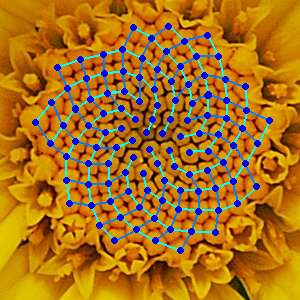This post is an excuse to show some photos of my white swan echinacea. Feel free to skip the text and look at the photos.
I'm not a math nerd. I think I struggled through calculus in high school and I know I struggled through geometry. Geometry made complete sense to me until one fateful day when I was helping a classmate study for a test. The next day I completely blanked out on the exam and my friend got an "A." Since then math has never been the same for me.
Nonetheless, it not's hard to be intrigued by patterns in nature that are a result of math. The Fibonacci Sequence is a series of numbers: 0, 1, 1, 2, 3, 5, 8, 13, 21, 34 .... Each number is the sum of the previous two.
0+1=1
1+1=2
1+2=3
2+3=5
3+5=8
5+8=13
8+13=21
This sequence is pervasive in nature in the spirals that form seed heads, in pine cones, and cauliflower. If you look at a the bottom of a pine cone or at a seed head, you will see that the spirals go clockwise and counterclockwise.
Nonetheless, it not's hard to be intrigued by patterns in nature that are a result of math. The Fibonacci Sequence is a series of numbers: 0, 1, 1, 2, 3, 5, 8, 13, 21, 34 .... Each number is the sum of the previous two.
0+1=1
1+1=2
1+2=3
2+3=5
3+5=8
5+8=13
8+13=21
This sequence is pervasive in nature in the spirals that form seed heads, in pine cones, and cauliflower. If you look at a the bottom of a pine cone or at a seed head, you will see that the spirals go clockwise and counterclockwise.
 |
| Source: Wikipedia Commons - Alvesgaspar |
There are 21 clockwise blue spirals and 13 counterclockwise aqua spirals. 21 and 13 are two numbers in the sequence. This pattern allows the density of the seeds on the head to be uniform without overcrowding in the middle or sparseness along the edges. Pretty cool, huh?
Look at the spirals the next time you see a sunflower or echinacea. Who knew math could be so fun? Do you know of other examples of the Fibonacci sequence in nature?




Na kwiaty matematycznie jeszcze nie patrzyłam, a to jest nawet ciekawe. Niezależnie od tego, zdjęcia kwiatów są bardzo ładne. Pozdrawiam.
ReplyDeleteThe flowers have not yet looked mathematically, and it is even interesting. Apart from this, images of flowers are very nice. Yours.
Very pretty. You ended up with a really nice full clump of the whites this year.
ReplyDeleteCher Sunray Gardens
OK I like math, but boy I did not know about this...I love when we can find subjects in school applied to everyday things...it is what we don't do well in school as teachers...we do not always apply the abstract....so posts like this that give me the wow factor are just the coolest. I will now be looking for this. Outstanding! BTW your echinacea is lovely!!
ReplyDeleteI tell you, Theta, your inventiveness intrigues as much as your illustration of nature's patterns. And, what beautiful subjects you used.
ReplyDeleteThat's phenomenal, GirlSprout. Math isn't my favorite either, but it's still really beautiful sometimes. So are your echinacea under the aspens!
ReplyDeleteToo cool!! When I watched the spiraling in the video, I immediately thought of the universe... Beautiful white swans! I had one in one spot, but this year, I have a new plant in a different spot. (yay) Yours look great.
ReplyDeleteWhite Echinacea I have never seen. It's beautiful. I do not understand the math at all. I do not like math :-(
ReplyDeleteI'm with you--not a math nerd either and had a scarring experience with Geometry. But I love reading about mathematical patterns like this in nature. Very cool!
ReplyDeleteVery cool! I must confess, I am a math nerd. I love learning about math in nature and seeing it in action!
ReplyDeleteI remember watching a math movie with Donald duck where they talked about this stuff. I haven't thought about it in years until now.
ReplyDeleteOMG!!!! I LOVE that you did a post on Fibonacci and I love that you added lagninappe at the end, but not really the end! I am not a math nerd, either, but I do have an appreciation for the complexity of math and LOVE LOVE LOVE Fibonacci. :o) So cool!!!
ReplyDeletespeechless.
ReplyDeleteFibonacci numbers are incredibly amazing! I have heard them called the Fingerprint of God, and I think that is an accurate reflection of what is revealed when one realizes that Fibonacci numbers are used throughout the universe, from DNA strands to the spirals of galaxies above us.
ReplyDeleteThe video is great!
ReplyDelete